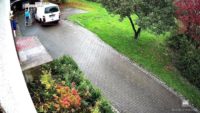When Jack Wu and John Hsu founded Nightingale Security in 2014, protecting premises with drones serving as eyes in the skies was pretty much off the radar for most commercial and industrial enterprises. Now, as Nightingale’s visionaries prepare to celebrate the company’s fifth anniversary in June, they’re also celebrating an innovation whose time has come.
Nightingale now ranks as the only robotic aerial security (RAS) enterprise serving several publicly traded Fortune 500 companies in North America. Its Blackbird drones, aptly named after the U.S Air Force’s SR-71 Blackbird, one of the most advanced surveillance aircrafts the U.S. has built, provide RAS for critical infrastructures. Some of the critical infrastructure applications include energy facilities spanning refineries and oil, gas, coal and nuclear plants; transportation systems; corporate locations; data centers; and large scale manufacturing, medical and agricultural research facilities. Nightingale considers RAS technology, which has been patented in the U.S. and other countries, to be a symbol of American innovation.
Nightingale’s software, Mission Manager, developed by specialists of SpaceX, NASA and Willow Garage, delivers autonomous remote operations (ARO). ARO reduces the need for human intervention while improving 24/7 mission readiness. Simply put, Nightingale’s drones and base stations, which are typically deployed on-site at customer locations, provide customers with automated perimeter patrols that keep watch over their facilities. The drones are equipped with both RGB and thermal camera for operations day or night. Thermal vision affords Nightingale’s customers superior visibility at low- and no-light conditions. Given the drones’ superior mobility, they’re particularly effective in monitoring large perimeters and terrain that’s difficult to navigate.
“Drones are much more terrain-insensitive when compared to ground-based robots, so they can be dispatched when an incident occurs and provide a much faster response,” said Nightingale Co-Founder Jack Wu. “Our system has shown it can work in very wet and windy conditions. We’ve performed over 10,000 successful precision landings; that’s one of our technical highlights.”
“Nightingale can do it better than anyone else,” said John Hsu, Nightingale's other co-founder. “The difference is in the software and, because of our extensive, onsite experience at our customers’ locations, we’re able to land in strong wind with an advertised 30 mph but, in testing, have achieved autonomous precision landing in up to 40 mph.”
Regular patrol missions and times are scheduled based on the customer’s specific needs and threat environments. Nightingale's technology integrates with a client's VMS, PSIM and other legacy systems for ease of use and to enhance its effectiveness. The system automatically dispatches a drone to the location when an alarm is triggered and delivers live video streams to the security team. Data can also be retrieved 24/7 from Nightingale’s base station, which acts as a secure data storage and edge computing platform.
To reduce financial friction for customer adoption, Nightingale’s solutions are subscription-based. Like a software subscription, its Robot as a Service (RaaS) subscription is based on a monthly fee/ annual contract. Installation, integration, maintenance and future software and hardware upgrades are performed by Nightingale, protecting customers against technology obsolescence.
“When reality comes close to the guiding vision, it’s very satisfying,” Wu said. “We have amassed a lot of field experience, which helped tremendously in proving out our technologies. You can have product renderings in your marketing materials and lab testing data but until you actually get out there to the customer location and gain real battlefield experience, you won’t encounter the problems that will spark solutions towards a complete product. In pioneering the RAS solution, Nightingale has developed a product that is helping us shape the future of physical security.”



